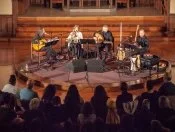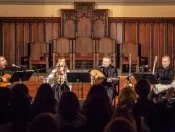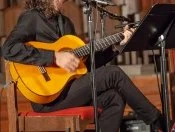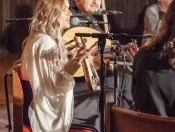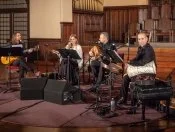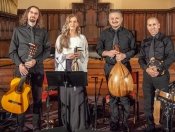Melding Cultures: Turkish-Arab Musical Dialogue
On November 16, 2019, over one-hundred and seventy people gathered at the Trinity Center for Urban Life to attend Al-Bustan’s concert, Amaan: A Turkish-Arab Musical Dialogue.“Amaan” means security, safety, and peacefulness and is found in Arabic, Urdu, Turkish, Farsi, Indonesian, and Pashto. The term is often used in the context of a vocalist expressing deep felt emotion.
On this especially cold and windy night, attendees trekked from across the city, suburbs, and from as far as Virginia to gather in the warmth of music, community, and cross-cultural collaboration. Amaan showcased Arab and Turkish music, both classical and contemporary, and brought these genres and styles into conversation with one another through the tremendous talent of The Istanbul Trio comprised of Aslihan Erkisi (vocals, kemenche), Ertugrul Erkisi (vocals, oud, tamboor), and Fatih Bayram (guitar) with Hafez Kotain (vocals, percussion).
An incredible melding of two, or really many cultures and genres...we don’t often get a chance to hear music like this! - attendee
The performance, in the words of one audience member was “both meditative and energetic”. The audience was at various moments transfixed, held completely still by Aslihan Erkisi’s haunting and clear vocal delivery of centuries-old Turkish folk songs, and by the next song, clapping and moving in their seats to Hafez Kotain’s rhythms, Fatih Bayram’s guitar, and Ertugrul Erkisi’s oud. Ertugrul Erkisi’s new compositions Gonul Sizim/My Aching Heart and Anne/Mother were interwoven with classical/folk songs Lamma Bada Yatathana/When He Appeared, Muhabbet Bagi, and Ah Ya Zain/Vineyard of Affection, resulting in a program that was, according to the audience, “mesmerizing”, “perfect”, and an “incredible melding of two, or really many cultures and genres...we don’t often get a chance to hear music like this!”
Photos by Chip Colson
Two traditional instruments were showcased: Ertugrul’s improvisations on both the oud and tamboor and Aslihan's delicately picked kemenche. Between songs, the group spoke about their instruments, families, languages, musical and cultural traditions, and their profound love of playing and sharing Turkish and Arab music.
The joy that the performers felt in performing together, interacting with the audience and celebrating their cultural connections, was palpable. An audience of contented listeners was able to share in their passion. At a politically charged time in the country, we especially appreciated the warmth and hopefulness of a community coming together to celebrate music, culture, and cross-cultural understanding.

